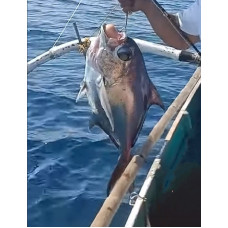Latin name
Brama japonica
Other names
Brama japonica
Identification
Brama japonica is a close relative of Brama brama, but can be distinguished by the greater number of gill stamens.
The body is tall, strongly compressed at the sides, oval in shape; body height is 43-50% of the standard body length. The head is high with a semicircular, steep upper profile. The snout is blunt, the mouth terminal and oblique. There are 17-21 gill stamens on the first gill arch.
Features of fish fins
Dorsal spines (total): 0; Dorsal soft rays (total): 33-36; Anal spines: 0; anal soft rays: 27-30. Dorsal and anal fins of adults with scales. Scales on caudal peduncle form a graded size series with scales on bases of middle rays of caudal peduncle.
Fish colouring
The body is dark brown with a silvery tinge on the sides. The dorsal and upper edges of the fins are blackish.
Distribution
Widespread throughout the Pacific Ocean from California to the Sea of Japan, especially in the northern part. Range boundaries change significantly throughout the year. In the winter months they move into the subtropics and in the summer they move into the subarctic region.
Habitat
Marine; pelagic-oceanic; oceanodromous; tropical species. Depth range 271-620 m. Rarely found in coastal waters.
Size
Maximum length: 61.0 cm. Maximum declared weight: 2.7 kg. Maximum declared age: 9 years.
Behavior
Do not form spawning aggregations.
Food and feeding habits
The diet of adults consists mainly of cephalopods and fish (mainly of the genus Bathylagus), as well as bocoplaves.
Reproduction
Spawning occurs throughout the subtropical waters from Japan (in the zone of interaction of the Kuroshio and North Pacific currents) to the California Current in water temperatures of 17-21°C.
Fishing
Recommended fishing techniques: Vertical fishing with natural baits, speed jigging and slow jigging.
Relationship with a person
Fish fit for consumption.
| Classification | |
| Phylum | Chordata |
| Class | Actinopterygii |
| Squad | Perciformes |
| Family | Bramidae |
| Genus | Brama |
| Species | B. japonica |
| Features | |
| Conservation status | Not Evaluated |
| Habitat | Edible |
| Life span, years | 9 |
| Maximum body weight, kg | 2,7 |
| Maximum length, cm | 61 |
| Sailing speed, m/s | No information |
| Threat to people | Pelagic |
| Way of eating | Predator |
Pacific pomfret
Tags: pacific pomfret


